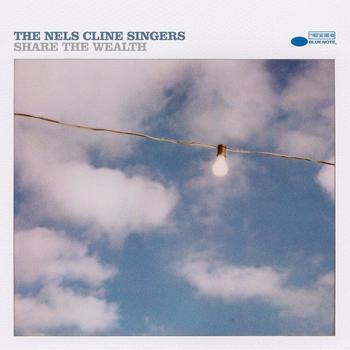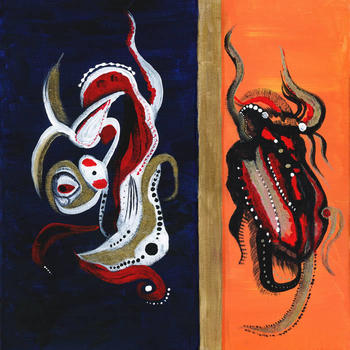The Nels Cline Singers, "Share the Wealth" (Blue Note)
Why listen to Nels Cline? Most great heavy music makes a gentleman want to take drugs, drop trou and shirk responsibilities. But even though Cline pushes the same buttons as Deep Purple's insane live "Mandrake Root," Led Zeppelin's rollercoaster live "Dazed and Confused" or Miles Davis' unwholesome "Calypso Frelimo," his music does not similarly discourage good citizenship. Is that a problem?
It's not that Cline restrains his rampaging electric guitar; he milks every weird sound he can imagine, and many he never expected. But while enjoying the ride, a listener must also perceive the mind behind the noise, a personality whose highest values are humanity and intelligence. Maybe seeing Cline perform many times, and witnessing the calmly focused way he goes about his art, plants a non-demonic seed. Well, the contradiction is something to ponder, but not to condemn. If Nels Cline flies with angels, we can still go to hell.
Since Nels and his twin brother, Alex, spent their teen years obsessing over Miles' 1971 "Live-Evil," it's no surprise that bedrock electric fusion often crops up in Nels' music, but especially in this version of the (voiceless) Nels Cline Singers. It's got keyboardist Brian Marsella to fill the spacy Keith Jarrett/Chick Corea role, drummer Scott Amendola to clack along like Tony Williams, saxist Skerik to portray a more melodic version of Dave Liebman, bassist Trevor Dunn to lay down the funky riffs, and percussionist Cyro Baptista to fill the Airto/Mtume seat. Nels, of course, is the Jimi Hendrix that Miles really wanted when he fortuitously settled for John McLaughlin.
"Wealth" indeed: Untold riches reside here. The colliding, surging sounds alone would make for a sufficiently sensual bath. Guitar feedback/distortion/wah run rampant via weeping ragas and psychedelic ascensions, or Cline might scale down to Japanese tea-garden pluck, or just plain rock out. Marsella spins around overhead like Tinkerbell, or overlaps with a closetful of FX textures so you can't tell who's barfing what. Grooves such as the hurrying funker "Princess Phone" abound, cuz Amendola grooves in his sleep.
What really separates Nels from Miles is the organization. Plenty of this stuff arose from jams, but a couple of 17-minute tracks seem way shorter because of the logical, satisfying way their segments interlock. And since these are Singers, we get songs, like the shoving drone of the opening "Secunda" and the wondrous concluding waltz, "Passed Down."
Heaven turns out to be fun after all.
Listen to two tracks from "Share the Wealth" here.
* * *
Jamael Dean, "Ished Tree"
The South L.A./Horace Tapscott piano legacy rests in good hands with young Jamael Dean. Here we receive him unfiltered -- alone at the keyboard and, as he puts it, engaging with the universe.
Mixed by Wayne Peet, the sound wafts a raw intimacy reminiscent of early Monk sessions recorded by Rudy Van Gelder. Dean's compositions/improvisations flow through adult lullaby, passionate lyricism and stirring pride, plus a gentle accompaniment to AK Toney's bold survival poetry on "Soul of the Griot."
The key to the Dean mystery resides in (Nate Morgan's?) "Tapscottian Waltz," where the pianist focuses the influences of his predecessor (who died when Jamael, grandson of Tapscott drummer Donald Dean, was a child): the originality; the fondness for triple meters; the way chords are allowed to overlap, ring out and form new harmonies. Dean is a more pensive, melody-oriented artist, though, with a more sensual touch, and it's nice that we can hear him breathing. He reminds us that the best jazz is not written, it's discovered.
Listen/buy here. And fall into the cataclysmic glory of the late Horace Tapscott's "Nyjah's Theme," arranged by Jamael Dean for today's Pan Afrikan Peoples Arkestra, here.
Also, dig some inspirational recent music from the still thriving Sun Ra Arkestra, conducted by Marshall Allen, here.


